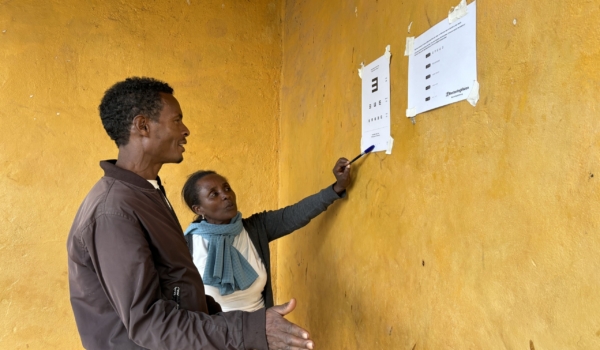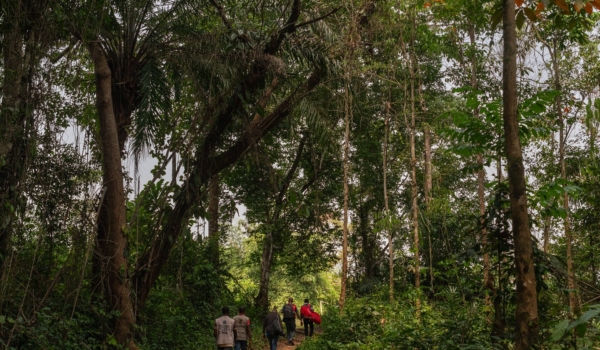By Michelle Choy, Senior Manager of Health Systems Strengthening at Last Mile Health and Pooja Sripad, Associate at Population Council
Community health worker programs are essential for the delivery of accessible, equitable, high-quality primary care. Without a significant expansion of support for national community health worker programs, universal health coverage is likely to remain out of reach.
From 2017 to 2021, Last Mile Health and Population Council collaborated on the Frontline Health Project with funding from the Integrating Community Health (ICH) Partnership, convened by USAID, UNICEF, and the Bill & Melinda Gates Foundation.
The ICH Partnership promoted communities as key resources in primary health systems to accelerate progress towards the Sustainable Development Goals and to institutionalize reforms and learning, with a focus on community health workers (CHWs). The partnership worked across seven countries: Bangladesh, the Democratic Republic of Congo (DRC), Haiti, Kenya, Liberia, Mali, and Uganda.
Key Takeaways
The Frontline Health Project elevated community health systems measurement, learning, policy, and programming through the development and implementation of tools, engaging in global and national discourse, and advocating for CHW voices to drive research and practice agendas. Key learnings across our portfolio of work include:
- Investing in targeted engagements with country governments and their coalition of partners can help achieve and sustain quality community health services at scale. This means looking holistically at the needs of the community health systems while building on political momentum and policy commitments.
- The success of community health reform relies not just on its technical design, but also on advocates’ ability to navigate and iteratively learn from the broader policy landscape and political dynamics. The Community Health Systems Reform Cycle offers a way to diagnose, assess, plan, and identify opportunities for institutionalizing community health within the broader health system.
A series of country snapshots describe applying the reform cycle framework in seven countries.
- To help lower- and middle-income countries advance toward universal health care, allocating country resources to ensure payment of CHWs and financing for CHW programs may offer a practical way to provide convenient and affordable essential health services. While there is no single best approach, the Framework for Purchasing in CHW Programs offers a tool to identify the fit-for-context improvements in financing arrangements.
- Countries formalizing CHW programs need measures to assess progress of their complex community health systems. The CHW Performance Measurement Framework and accompanying indicators and scales, integrating community member and CHW perspectives, offer a starting point for developing national community health monitoring and evaluation strategies across geographies and health specialties.
- Addressing identified evidence gaps, mixed methods research in five countries unveils strategies to enhance CHW motivation and performance, including digital tools, financial incentives, and non-financial enablers such as recognition, materials, and support supervision.
- In times of crisis or external shocks, including that of COVID-19, research across three countries reveals that CHWs play an essential role in sustaining health service provision and resilience within communities.
Looking Ahead
The Frontline Health Project resulted in key documentation (linked above) profiling the lessons learned across seven countries. These publications can help inform future efforts to institutionalize and measure community health programs at the national level, and we hope they can be utilized by stakeholders at different levels: governments, implementation organizations, research organizations, and policymakers. Additionally, Last Mile Health and Population Council’s work in community health and social systems continues in a number of ways.
Last Mile Health works to realize a health worker within reach of everyone, everywhere by:
- Continuing to partner with governments to extend primary healthcare to the world’s most remote communities by designing, growing, and sustaining community health systems.
- Sharing tools, research, and best practices globally to contribute to the movement for universal health coverage.
- Advocating globally for all community health workers to be professionalized, which means they are trained, paid, supervised, and supplied as part of national health systems.
Population Council participates in global community health systems technical assistance and work at the community level in varying capacities, some of which include:
- Investigating community-based group antenatal care and postnatal care among urban poor first-time pregnant women in Bangladesh.
- Evaluating social and provider behavior change programs, including community-based service delivery and partnership, under Breakthrough Research.
- Empowering adolescents through community-based networks and safe spaces in Mexico, Guatemala, Haiti, Kenya, and Zambia.
The Frontline Health Project team sees our collective achievements sustaining and informing community health roadmap country strategies moving forward. We hope the suite of tools below are helpful for policy and program practitioners looking to strengthen, measure, and advocate for community health at national and local levels.
——
The Frontline Health Project is grateful to all those who participated in our studies, including community health workers (CHWs) and national and subnational community health stakeholders – we hope your voices and experience continue to shape agendas moving forward. We’d like to recognize the support of the Bill & Melinda Gates Foundation, as well as the Integrating Community Health Partnership convened by USAID, UNICEF with our partners including Agha Khan Foundation (Mali), Zanmi Lasante (Haiti), Pathfinder International (Uganda), LVCT Health (Kenya), Save the Children (Bangladesh), Humana HPP-Congo (DRC), and Last Mile Health. We’re grateful for technical advice and collaboration with Johns Hopkins University, the World Health Organization, World Bank, Healthcare Information for All (HIFA), IntraHealth, Liverpool School of Tropical Medicine, Brigham and Women’s Hospital, and the Centers for Disease Control and Prevention. We recognize and deeply value the coalition colleagues that have traveled with us, share our passion for strengthening community health systems, and have supported us in knowledge sharing and research uptake—including the Health Data Collaborative, Frontline Health Worker Coalition, CHW Hub, and the National Community Health Indicators Project.




